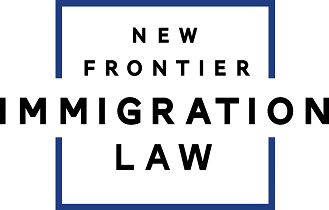
The Immigration and Naturalization Act (INA) allows many people to gain U.S. citizenship through several paths. One way people from other countries can work toward citizenship is to serve in the U.S. military. However, when your loved one dies due to a service-related injury or illness, you may worry that your family’s options to stay in the U.S. or become citizens will disappear.
But that’s not the case. In fact, you can honor your loved one by applying for post-death citizenship on their behalf through U.S. Citizenship and Immigration Services (USCIS). An immigration lawyer from New Frontier Immigration Law can help you file the essential forms to request this special honor and guide your family through maintaining permanent residency or getting citizenship.
What Is Form N-644 Application for Posthumous Citizenship?
Form N-644, Application for Posthumous Citizenship is a formal request to grant U.S. citizenship to a late active-duty military service member who died from a service-related injury or illness.
To grant posthumous citizenship, the branch of the U.S. Armed Forces in which your loved one served must verify that they “served honorably” and their death (or cause of death) was “combat related.” The USCIS then will verify your relationship to the deceased and your eligibility to file this request before deciding to approve or deny your request.
If the agency approves your application, your late loved one will have honorary U.S. citizenship starting from their death date. You, as the applicant, will receive a letter confirming the decision and an official Certificate of Citizenship (Form N-645) for your late loved one.
Qualifications for Posthumous Citizenship
For your late loved one to qualify for posthumous citizenship, they must have:
- Been an alien/permanent resident or non-resident
- “Served honorably” as active-duty military personnel in the U.S. Army, Navy, Marines, and Air Force during one of the following qualifying hostile conflicts: World War I, World War II, the Korean War, the Vietnam War, the Gulf War, the War in Iraq, or other qualifying hostilities per the president’s executive order
- Died because of an injury or disease their service developed or worsened
- Met enlistment, reenlistment, induction, or entrance requirements in the U.S., Panama Canal Zone, American Samoa, Swain’s Island
We can help you determine if your loved one met these requirements to qualify for posthumous citizenship.
Who Can File Form N-644?
The following qualifying family members can file Form N-644 to request posthumous citizenship for their late loved one:
- Spouse, even if they remarried after the loved one in question died
- Parent
- Child
- Sibling
Other non-family representatives may file the form:
- Executor or administrator of the deceased’s estate
- The deceased’s guardian or conservator
- A committee of the deceased’s next of kin
In addition, representatives from the Department of Veteran Affairs (VA) and even the Secretary of Defense or the Secretary’s USCIS designee can file the form.
Our immigration lawyer from New Frontier Immigration Law can determine if you qualify to fill out this form or if you must work with another, more closely related family member to do so.
Can Filing Form N-644 Help Me Become a U.S. Citizen?
While filing Form N-644 is a great way to honor your loved one’s sacrifice for the U.S., it can also help you and other eligible family members qualify for naturalization per Section 319(d) of the Immigration and Nationality Act (INA). It can also help surviving family members obtain or maintain lawful permanent resident status in the U.S.
How to File Form N-644
You must file Form N-644 within two years of your late loved one’s death, whether they were serving in the U.S. Armed Forces or died from complications resulting from prior service.
Follow these steps to complete the application in full:
Fill Out the Form
You can download and print a copy of Form N-644 from the USCIS website. Make sure the form your complete is marked with the correct edition. The USCIS only accepts these two editions:
- 11/10/20
- 08/05/15
You only need to complete Part I of the application. Parts II through IV are for internal office purposes with the USCIS, Department of Defense, and the relevant branch of the military.
Include Extra Pages and Translations as Necessary
If you need more room to answer questions in full, you can write that information on extra sheets of paper and include those with your application.
If you fill out the application in a language other than English, you must submit a certified translation of the form. The translator must sign and certify the translated document.
Gather Evidence
You must submit relevant proof of your loved one’s military service record, death, relationship to you, and other information. Necessary evidence includes:
- Authorization documents: Depending on your relationship to the deceased, you may need to get approval from all living next of kin, who will sign relevant sections of the form. You may also need to submit certified documentation of being named the deceased’s executor or administrator if that is your role.
- Relevant military records/certificates: You will need to submit a copy of Form DD 214, Certificate of Release or Discharge From Active Duty. You can also request a copy of this form from the VA.
- Proof of death: You will also need to submit a copy of Form DD 1300, Report of Casualty/Military Death Certificate, or another military- or state-issued death certificate.
Do not submit original copies of these documents unless you are told otherwise. Submit only clear photocopies of official documents to keep the originals for your files.
Send in the Completed Application
Mail to the USCIS California Service Center in Laguna Niguel, California.
How Much does It Cost to File Form N-644?
You do not have to pay processing fees to file Form N-644, Application for Posthumous Citizenship.
Can I Appeal a Rejection of Posthumous Citizenship?
No, there is no appeal process for the USCIS denying your loved one’s post-death grant of citizenship. USCIS will provide you with a letter explaining why your application was rejected.
It’s important to note that missing evidence and other incomplete elements of your application do not automatically result in an application being rejected. However, it helps to have an immigration lawyer to ensure every part of the application is complete and that the right people have signed and dated all documents. They can also ensure you include the proper evidence documents before submitting your application.
New Frontier Immigration Law Serves Late Military Service Members and Their Families
At New Frontier Immigration Law, we know how complex the U.S. immigration system is, so we want to help people navigate the process of becoming permanent residents or citizens.
We can help you determine if filing Form N-644 makes sense for your family and advise you through the entire application process. Call us today for your strategic session.

